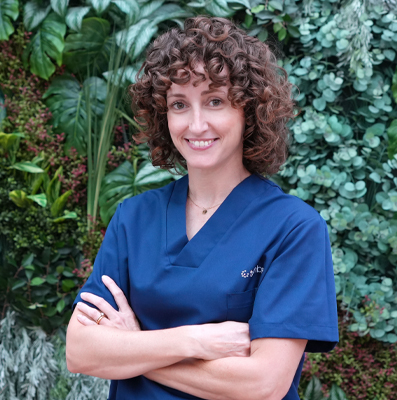Leonor Ortega
Senior Embryologist at Clinica Tambre
- Degree in Biological Sciences from the Universidad de Valencia in 2006
- Master’s Degree in Human Reproduction from the Universidad Complutense de Madrid and Sociedad Española de Fertilidad (Spanish Fertility Society) in 2008

“Embryology is an ongoing challenge, each patient is unique and that forces you to never let your guard down.”
Learn more about me
I never thought of becoming an embryologist. Whenever I tell people this, they are always surprised. Embryology came into my life because of love. My partner was in love with this world and got a job as an embryologist in Madrid, so I decided to follow his steps; to be with him. Eventually, one thing led to another, and I started working at Tambre as a biologist collaborating with the University Department of Genetics in March 2008. This world began growing on me bit by bit thanks to the opportunity that Dr Caballero and Dr Rocío Núñez gave me. I trained and developed my career in this field, and here I am still, a few years later.
I have always said that the work of an embryologist is not a job, but a way of life, it is hard not to be connected 24/7 since that is what we do, we generate life, and life is continuous, life does not stop. That is what is so rewarding, to be continuously generating life, illusion and solutions for others, or at least trying to do so and accompanying patients in the process.
The truth is that this profession involves constantly being up to date. We are always discovering new solutions that improve procedures and treatments, and we attend scientific conferences several times a year. We are in constant contact with colleagues with whom we share experiences, cases and concerns, and all of this enriches us and makes us advance tremendously.
In addition, I belong to the Asociación para el Estudio de la Biología de la Reproducción (ASEBIR, Association for the Study of Reproductive Biology), an interest group for translational research and innovation. We are a group of leading national and international research professionals, and we meet several times a year. We discuss advances and how to implement basic research studies in clinical practice.
Embryology is an ongoing challenge. Each case, each patient, each embryo, each oocyte is unique; none is the same. So, this forces you to never let your guard down.
The biggest challenge, however, is undoubtedly to support the patient, to be able to see their emotional needs and to be able to reassure them during the process.
To be honest, some days are better than others. It is very difficult to keep a distance and not get involved. The easy cases that are successful on the first try are the ones that go unnoticed, but the patients with whom it takes us a little longer to achieve success are perhaps the ones with whom you establish the strongest bond and the ones you take home with you. It is inevitable not to do so.
I have always carried a case in my mind that made me realise that everything is possible. It helps me not to give up, as long as the patient is willing to continue. This was a couple who had a semen sample taken with a very complicated testicular biopsy. Two people worked on microinjecting 16 oocytes, as finding motile sperm was almost impossible. In the end only one was fertilised correctly, which evolved and reached blastocyst on day 5 and was biopsied. The result of the PGT-A (Preimplantation Genetic Testing for Aneuploidy) revealed an amplification failure, and we had to devitrify and biopsy it again. The result was a ‘mosaic embryo’ (an embryo with a mixture of normal and altered cells). We offered genetic counselling to the patients, and they opted for the transfer. That mosaic embryo was full of hope and fighting spirit. And today she is a beautiful baby girl.
While it is very difficult to give advice in such situations, I would like to tell them that in these times we live in they should trust the group of professionals with whom they decide to undergo treatment, that they should let themselves be guided and that they should commit themselves unreservedly. We are here to help, and we have a common goal.
I could say that I do not know what free time is as I am so restless that I never stop doing things.
Apart from work, I try to exercise at least four days a week, because that is what helps me disconnect the most, as my head is always active, and I cannot stop thinking. I love making digital photo albums and, above all, spending time with family and friends, which is the only thing that really matters.

